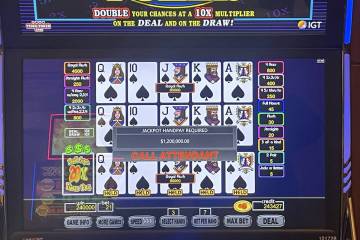Macau official: Subconcession necessary to save Sands from elimination
A Macau government official said Friday he was faced with a Catch-22 dilemma in late 2002: either split a shared gambling concession between feuding Las Vegas Sands Corp. and Hong Kong-based Galaxy Entertainment or accept that neither company would have the ability to open a casino in the expanding Chinese region.
Jorge Oliveira, the commissioner for legal affairs for the Macau Gaming Commission, told a Clark County District Court jury the solution was obvious. Macau's top legal officer said he created a subconcession for Las Vegas Sands in December 2002 because it was clear the company would have been awarded a right to operate a casino if the entire bid process had been reopened.
Oliveira was testifying for a second day in the 2-week-old lawsuit brought by Hong Kong businessman Richard Suen, who claims he's owed millions of dollars by Las Vegas Sands for helping the company obtain a Macau gaming license.
Oliveira, who was a member of the Tender Commission that selected the joint bid between Galaxy and Las Vegas Sands as one of three gaming concessions in February 2002, said the commission's rules would have eliminated both companies by the end of the year. Macau was in the process of expanding gaming in the Special Administrative Region, eliminating a casino monopoly controlled by Hong Kong billionaire Stanley Ho.
Galaxy, which had been the lead company with its bid, and Las Vegas Sands, which had a management agreement, could not agree on a contract. Oliveira tried to mediate the negotiations, but to no avail.
"We were at an impasse and it was a very difficult situation," Oliveira recalled. "It was too late to reopen the tender process and we would have had only two concessions. The liberalization of gaming would have looked ridiculous."
Oliveira said he came up with the idea of a subconcession, which had the same rights as a gaming concession. He told jurors the concept was approved by Macau Chief Executive Edmund Ho, even though the subconcession led to four gaming concessions rather than the eventually agreed upon three.
"It was my idea and, from what I could see, it was the best solution," Oliveira said. "If Galaxy and (Las Vegas Sands) had been eliminated, it would have been a political blunder for Macau."
Two years after the decision, Las Vegas Sands opened the Sands Macau, China's first American-run casino. The company opened the massive Venetian Macau last year and is building 12 additional resorts on the Cotai Strip. Galaxy opened the Star World hotel-casino in 2006 and is building another resort.
During his time on the witness stand, Oliveira, under questioning from Las Vegas Sands attorney Rusty Hardin, repeated Thursday's testimony that the Chinese government did not control Macau's casino licensing selection process.
Attorneys for Suen contend his efforts in setting up a series of July 2001 meetings in Beijing between Chinese government leaders and Las Vegas Sands executives played a key role in the company winning the concession it shared with Galaxy.
During testimony Friday, Oliveira said in January 2002 the Tender Commission asked Arthur Andersen, at the time one of the top five accounting firms in the United States, to rank the bidders based on their experience operating casinos. According to a confidential report entered into evidence, MGM Mirage, a partnership between the Mandalay Resort Group and Park Place Entertainment, and Wynn Resorts Ltd., were the top three bidders. The Galaxy-Las Vegas Sands bid was ranked fifth by Arthur Andersen, behind Stanley Ho's bid.
However, the eight-member Tender Commission integrated the Arthur Andersen report with their own list of criteria, which awarded additional bonus points for gaming experience and the scope of each company's proposed project.
The Tender Commission then awarded concessions to Wynn, Stanley Ho -- who was operating 11 casinos in Macau under his monopoly -- and the Galaxy-Las Vegas Sands partnership.
Oliveira testified he was unaware of any meeting in January 2002 between Las Vegas Sands President Bill Weidner and Edmund Ho, who according to previous testimony, asked Las Vegas Sands to join the Galaxy bid.
Under questioning by Suen attorney John O'Malley, Oliveira admitted that Galaxy would not have won a gaming concession if it had not been partnered with Las Vegas Sands.
"Did Galaxy get a concession it did not deserve?" O'Malley asked Oliveira. "Yes," the Macau official responded.
Contact reporter Howard Stutz at hstutz@reviewjournal.com or 702-477-3871.

















